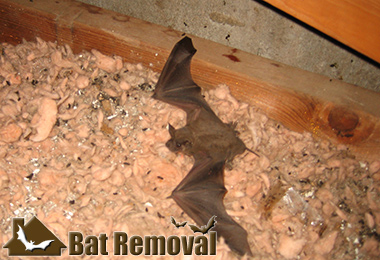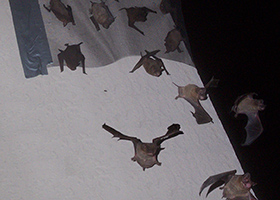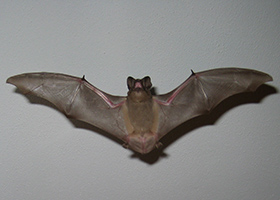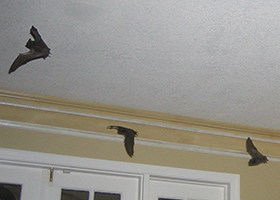Lansing Bat Removal
Welcome to Lansing Bat Removal! We are Michigan bat removal specialists. It is important to know that bats are protected by Michigan law, and are beneficial animals to have in the environment. We do not kill any bats during our bat removal process. Never hire a pest control company or anyone who says they are a Lansing bat exterminator. For correct and effective bat removal, you want a company that specializes in humane bat colony extraction. Our process is not only the only legal method in Michigan, but it is the most effective. We have a 100% success rate in our bat control process. We perform our industry-best 32-point inspection of your house or building, and seal shut all bat entry holes down to 1/4 inch as part of the removal process, during which we remove the colony via special one-way exclusion devices specific to your architecture. Once all bats are safely out, we permanenetly bat-proof the structure. We also provide guano (bat droppings) removal and decon. Click on our Lansing Bat Control Prices page to find out more about our prices for bat control work. We work 24/7/365, and would love to talk to you about your bat problem. Call us any time at 517-219-1116 to discuss it, discuss our pricing, and if you wish, set up an appointment at your convenience, often same-day.

Lansing Building and Attic Inspections

No-kill Michigan Bat Extraction

Guano Cleanouts - Serving all of Michigan
Call 24/7 to discuss your bat problem.
Same-day or next-day appointments.
32-point inspection of your property.
Written estimates for bat removal project.
Fully state licensed and insured.
Residential and commercial service
100% no-kill Lansing bat extraction
Complete bat-proofing of your building
Compliance with all Michigan, federal laws
Guano removal and attic decontamination
Our Service Range - 517-219-1116



4 Facts That Will Convince You That Bats Are Not Blind
The bats are hunting at sunset and they will be using their echolocation to determine the location of their target. This means that they will be relying on sounds that will bounce off from the object that will help them avoid obstacles. This has led to the common belief that bats are blind creatures. However, several studies show that different species of bats will have varying visual acuity.
Why Bats are Not Blind
Contrary to the usual misconception, bats are not really blind. According to the expert, there are instances when they will use their eyes when hunting insects. There are also type of bats such as the fruit bats that will drink nectars and will not use echolocations. They have an excellent eyesight and other bats can even see ultraviolet rays.
1. The Ability to See in Daylight
In a study that was published at the PLOS Journal, they found out that two species of the small bats; the Seba short-tailed, and the Pallas Long Tongued Bats both carry visual receptors that enables them to see color in a daylight. These species can be encountered on the Central and Southern part of the US. They also have receptors that may help them see color wavelength and ultraviolet rays. This is beyond the capacity of your average human eyes.
2. Their Eating Habit
Some bat species will not need echolocation to hunt for foods. They may, however, need to see ultraviolet to help them find flowers. Different types of flowers can reflect this type of light that allows the fruit bats to locate nectar. UV Vision seems to be more prevalent on species of bats that use echolocation on modulation frequency.
3. Using Sonars and Visuals Together
On some species of bats, using both their eyesight and echolocation will increase their hunting output. This is especially true for the Egyptian Fruit Bats. According to a study released last 2015, they discovered that bats will use echolocation as the area becomes darker. However, they will also produce the clicking noise in a bright surrounding. Echolocation will also be used as the bat will land on the ground. This may suggest that they will be using a combination of skills to determine the distance between the objects.
4. Insectivore Bats are Using Visual Cues
Even the bats that are insect hunters will be using their eyesight when hunting. The Plecotus Auritus will prefer to hunt when they are using both of their sonar and visual information. It is surprising to note that this bat prefers their visual information over the sonar data that they've gathered. This fact has been posted on the Journal of the Animal Behavior. Other types of bats will also use their eyes to evade the attack of their enemies.
Bats are not blind. They are known for having an extremely sensitive vision that helps them navigate even on a dark location. Their average eyesight is comparable to humans. Their eyes need to be sensitive to the levels of light that will help them identify that it is the perfect time to come out of their roosting site and hunt.

